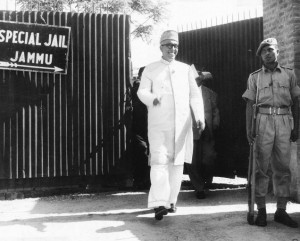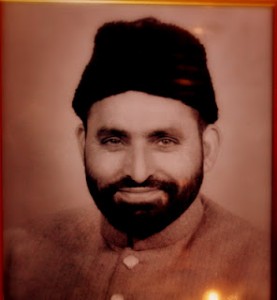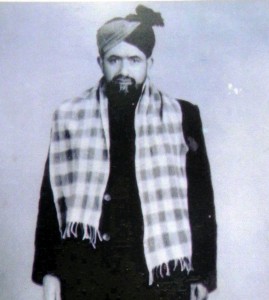Peace Watch » Kashmir-Talk » Munshi Ishaq- A Freedom Fighter Tells his Story
Munshi Ishaq- A Freedom Fighter Tells his Story
But we come across instances of some fighters who showed the nerve to reverse the trend by writing about various aspects of Kashmir resistance movement. One among these is Munshi Ishaq who had the audacity to utilize gainfully his jail time in knitting together the real events of Kashmir’s struggle against all kinds of adversity under the title: Nada-I-Haq (The voice of truth), a manuscript which his son Munshi Ghulam Hassan has published in the form of a book.
Going through the pages of this book is like standing up near a broad, wide window to get a clear, real, genuine view of the struggle that the Kashmiri Muslims launched against their Hindu rulers in early thirties of the twentieth century. It is like swimming through a vast ocean of information on Kashmir; its history and politics; its trials and tribulations; its struggles and sacrifices; its disputes and wrangling; its aspirations and ambitions and all that concerns its people: Sunnis, Shias, Pandits, Dogras, etc. Written in lucid Urdu by one of the most inspiring and influential Kashmiri of his times, who had the privilege of being not only privy to the events that shaped the Kashmir narrative but also one of their prime movers, the book encompasses all aspects of Kashmir’s untiring and unrelenting hunt for honour, dignity and freedom from want, suffering and illegal occupation and takes the reader through the dark recesses of contemporary history to take a peep at important upsurges– like the theft of Mo-i-maqads and the Mujah-i-Din’s intervention in the state affairs—that impacted Kashmir so markedly. To ensure a systematic fortification of Kashmir’s distinct identity and revival of its historical individuality, which has remained deeply embedded in the silt of vicissitudes owing to its cringing submissiveness and abject subservience to alien forces, disparate creatures and ill-assorted entities over a long period of time, theauthor avows to do everything possible within his means.

While shedding a flood of light on various facets of Kashmir’s quest for a better future and dissecting, in an inimitable style, the contributions of its movers and shakers with a razor-sharp observer’s spawning acumen and aptitude, he doesn’t wriggle out of reporting his own flaws and misfortunes. With his insightful skill he furnishes an apt description of the situation obtaining in Kashmir during his lifetime. By attempting to remove, of course with great success, the lid from the surreptitious and stealthy activities a large majority of Kashmir leaders were used to indulge in for considerations of power and wealth seriously to the detriment of indigenous struggle and discomfiture of its genuine and sincere initiators, he brings to light, thus, what would have otherwise remained hidden from the public eye. Equally forceful is his portrayal of dubiously devised process of Kashmir’s appropriation by occupation forces, which they accomplished with the assistance of local collaborators who were never wanting in fulfilling a huge wish list of their Indian masters even at the cost of their self-respect.
He exposes these turncoats one by one in unequivocal terms; placing their pettiness, selfishness, smallness and above all their unending callousness, toward the misfortunes of the masses, in public domain and before historians and researchers to ponder upon and write about. Not an iota of discrepancy is found in what he writes about these leaders–their character; their understanding; their dedication—and what they actually were in their real life. They are shown in their true colours.
The portraiture of Abdullah bears out an exact copy of an impatient, inconsistent, conceited, snobbish and high-handed leader who doesn’t see left or right while traversing the most difficult path of the Kashmir struggle, or negotiating his way out of its thorny phases, or dispensing justice to the people in his capacity as Chief Emergency Administrator and Prime Minister, or taking decisions relating the future of his countrymen.

Bakhshi Gulam Muhammad stands in sharp contrast to Abdullah, his chatta kilma. Despite his academic and economic failing he is overwhelmingly bursting with youthful enthusiasm and high spirits and appears so ambitious, so determined to do it all to ascend the heights under all circumstances. He comes into full sight with the worthiness and blemishes of his youth against the background of his social-ecology and history that unfolds his shabby deeds amply including his conversion to Christianity and reconversion to Islam on the eve of his joining politics. With all his innate tendencies toward deceit, treachery and corruption he is seen always busy thriving on the misfortunes of others; shying not to surpass brazenly each and every limit of perfidy and deception to earn an unsavoury reputation that continues haunting those who have lived Bakhshi era.
Maulana Masoodi appears on the scene under the cloak of righteousness, politeness and civility with a long shroud of mystery graciously spread over his shoulders to swathe up his intentions, which are extremely difficult to grasp even by a discerning and astute mind. Endowed with an enigmatic personality and a gentle, soft-spoken demeanour, he is often seen at his best impressing and gratifying his audience with his characteristic shrewdness, wisdom and knowledge. Hardly would there be a person whom the Maulana hasn’t awed with his gentle voice and phraseology, which he was habitual of using carefully with the intent of placating conflicting opinions. But he seems a little lackadaisical at times and too prone to shrugging off criticism and shirking from responsibilities more particularly at critical times.
Mohi-ud-Din Kara wears a mask to pretend to be what he actually is not. He is always busy in endearing himself to the masses with his histrionics. He doesn’t mind playing hide and seek and going underground to find a niche as a serious and dedicated politician to be, ultimately, able to project himself no. 2 in the hierarchy of leaders after Sheikh Abdullah. He is least moved and stirred by the massacre of his workers at the hands of Indian forces. Instead of mourning the innocents and agitating their carnage he manages to silence the bereaved and thwart the growing public disquiet about such barbarous acts to evade the displeasure of perpetrators, his masters at Delhi. Later on he becomes a staunch Pakistani enthusiast and floats the Political Conference to support Kashmir’s accession to Pakistan and to top its large payroll. At one point of time he is arrested along with gold ornaments, which he had purchased at Delhi with the money received from his Pakistani conduits. It was on the intervention of Gulam Muhammad Sadiq, his relation, that he was set free along with the confiscated stuff.
GM Sadiq emerges in the narrative as one who doesn’t subscribe to any religion but is thoroughly disposed toward Marxism or communism. As an irreligious person and thorough agnostic he never loses opportunity to castigate nimazis and rozdars. At times he is quite brazen in ridiculing people for their religiosity. He doesn’t even hesitate giving a pity look to his host, the author of the book, when he breaks his roza and offers nimaz in his presence at his house in Lahore where he had accommodated him as his dear, honoured guest. He dares calling him a crazy fanatic and a raving lunatic notwithstanding his kindnesses and hospitalities, which he was always prompt in extending to him whenever he visited pre-partition Punjab.
“Mirza” Afzal Beig comes into view as a trusted lieutenant of his leader, Sheikh, who cares a lot about his career and ensures his induction in the Mahraja’s cabinet as Minister in charge PWD. He is immensely vibrant, awesomely witty and hilariously engaging. To attract public attention he makes a good use of his wit and humour. His intelligence, drollness, satire and frequent use of parables and maxims are a great source of inspiration to others. But despite his intellectual and academic attainments and an adequate understanding of law and politics he fails to surpass the achievements of Bakhshi Ghulam Muhammad, a semi-literate, middle pass.
Munshi is equally eloquent in highlighting the naivety, ignorance and insensitivity of these leaders who, barring a few (a microscopic minority), were dull and raw to understand even a simple question: why did Indian Muslims severe their relations with India to create Pakistan? He also demolishes the facade of aura, which these leaders had managed to create, through their stooges, around their persona in order to inflate the constituency of their followers.
He spares no efforts in presenting a moving critique of those befooling people in the name of religion. He skilfully sketches out what Mullahs, Peers and Babas were actually up to and how they would trick and exploit the gullible for trivial things and raise the bogey of Islam in danger to scare those inimical to their interests; Pandit Hargopal’s altercation with a Mullah amply illustrates this.
Likewise he doesn’t lack in evoking memories of those who fell to the Indian bullets on the arrival of occupation forces on the soil of Kashmir. He deserves kudos for being the foremost in bringing into focus those who haven’t so far found a mention even in the footnotes of history. His painstaking research for identifying the names of unsung heroes slaughtered by aliens and marooned by their own leaders is really commendable. With his perceptive scrutiny he dispels our doubts about men, matters and events that have gone into shaping Kashmiri psyche and narrative of resistance.
The book, therefore, isn’t just only the memoirs of a Kashmiri who set himself up exerting continuously, vigorously and obtrusively to engage in a crusade for the emancipation of his birth burg from want and suffering; the noble cause for which he didn’t hesitate to forego even rich pickling of his roaring business. It is much more than that. Undoubtedly it is a unique amalgam of his personal experiences; his thoughtful observations of the angst the poor Kashmiris were going through over a period of time; his reflections on men and matters and on double-dealings and ever changing postures of leaders, politicians and his close companions.
It is a valuable treatise on Kashmir. Its importance is further amplified by the fact that it has been written by a native who had no pretentions of a professional historian or a full time scholar but was an ardent supporter, active freedom fighter and one among the pioneers of the resistance movement. He has penned down the tale of bitter days while spending his days in different jails. Since jail was his second home his frequent internments have awfully interfered with the chronology of events that have found a space in his book; making it difficult for the reader to place these within the time frame of their actual occurrences.
There are some other glaring lacunas, which are increasingly weighing down the importance of the book; impairing its neutrality to a large extent. He lends too much credence to dreams and imaginary series of happenings and gives prominent space to unauthenticated details and what is mere heresy. The author fails miserably to conquer his prejudices, which so often constrict his objectivity and diminish reader’s interest beyond doubt. He does not shy away from revealing his instinctive reactions to situations that were unpleasant, tiring and ugly, wicked enough to upset the entire population of Kashmir and engulf it with the frenzy of sectarian discord. He, therefore, blows out of proportion the sectarian bickering, which took place intermittently to vitiate peace in the city of Srinagar.
No evidence is forthcoming to corroborate his contention that 900 Shia women and children were burnt alive in a tunnel at Zadibal, Srinagar; a tunnel which he believes to have been dug up by the Shias inside a hillock to conceal and protect them against the Sunni onslaught (see p. 70). Nor have any traces of so-called tunnel or imaginary hillock or the fossils, remains—bones, skeletons etc—of the burnt persons found so far.
—The author is former commissioner secretary education. He has written many books on Kashmir and his forthcoming book is ‘Legends of Unsung Heroes’. Feedback: drahadhist@yahoo.co.in
The article was published in Kashmir Reader- put on the site with the permission of the author Dr. Abdul Ahad .
Written Byadmin
Filed under: Kashmir-Talk








